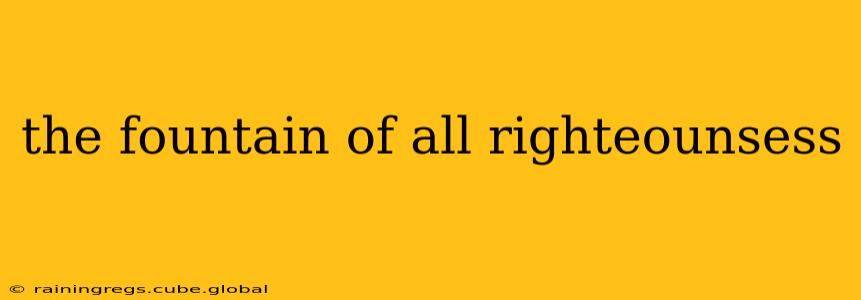The Fountain of All Righteousness: Exploring the Biblical Concept
The phrase "fountain of all righteousness" originates from Jeremiah 2:13, where the prophet laments the Israelites' abandonment of God: "For my people have committed two evils: they have forsaken me, the fountain of living waters, and hewed themselves out cisterns, broken cisterns, that can hold no water." This passage uses the imagery of a fountain to represent God, specifically highlighting His role as the source of true righteousness and life. Understanding this biblical concept requires exploring several key aspects:
What does "fountain of all righteousness" mean?
The phrase signifies that God is the ultimate and exclusive source of true righteousness. Righteousness, in this context, isn't simply adhering to a list of rules, but rather a holistic state of being characterized by holiness, justice, and right relationship with God and others. It's a spiritual reality emanating from God Himself, not something achievable through human effort alone. The "fountain" metaphor emphasizes the abundance and ever-flowing nature of this righteousness, freely available to those who seek it.
How does this concept relate to the Christian faith?
In Christianity, Jesus Christ is understood as the ultimate manifestation of this "fountain of all righteousness." His perfect life, sacrificial death, and resurrection are seen as the means by which God's righteousness is imputed to believers. Through faith in Christ, individuals are reconciled to God and receive the gift of righteousness, a transformative grace that empowers them to live lives pleasing to God. This isn't a self-earned achievement but a gracious gift, freely given.
What is the difference between human righteousness and God's righteousness?
Human attempts at righteousness often rely on self-effort, legalism, or outward conformity. This is represented in Jeremiah's metaphor as "cisterns," which are inadequate and ultimately empty. They may offer temporary satisfaction but ultimately fail to quench the deepest thirst for spiritual fulfillment. God's righteousness, on the other hand, is a supernatural gift, a radical transformation of the heart and life brought about by the Holy Spirit. It's not about outward appearances but an inward change that flows outwards into actions and relationships.
How can we access the fountain of all righteousness?
The Bible teaches that access to this fountain is achieved through faith in Jesus Christ. This involves acknowledging our own inadequacy and dependence on God's grace, repenting of our sins, and accepting Christ's sacrifice as the atonement for our wrongdoing. It's a relationship, not a transaction. Through this relationship, we receive the Holy Spirit, who empowers us to live out the righteousness that flows from the fountain of God’s love and grace.
What are the consequences of rejecting the fountain of righteousness?
Jeremiah's imagery clearly illustrates the consequences of rejecting God as the source of righteousness. Those who "hew themselves out cisterns" – those who seek righteousness through their own efforts – find themselves spiritually parched and unsatisfied. Their lives lack the true life and fulfillment found only in a relationship with the God who is the fountain of all righteousness. This spiritual thirst can lead to a sense of emptiness, dissatisfaction, and ultimately, separation from God.
In conclusion, the "fountain of all righteousness" is a powerful biblical image that encapsulates God's role as the ultimate source of true righteousness and life. Understanding this concept is essential for grasping the heart of the Christian faith and embracing the transformative power of God's grace.
